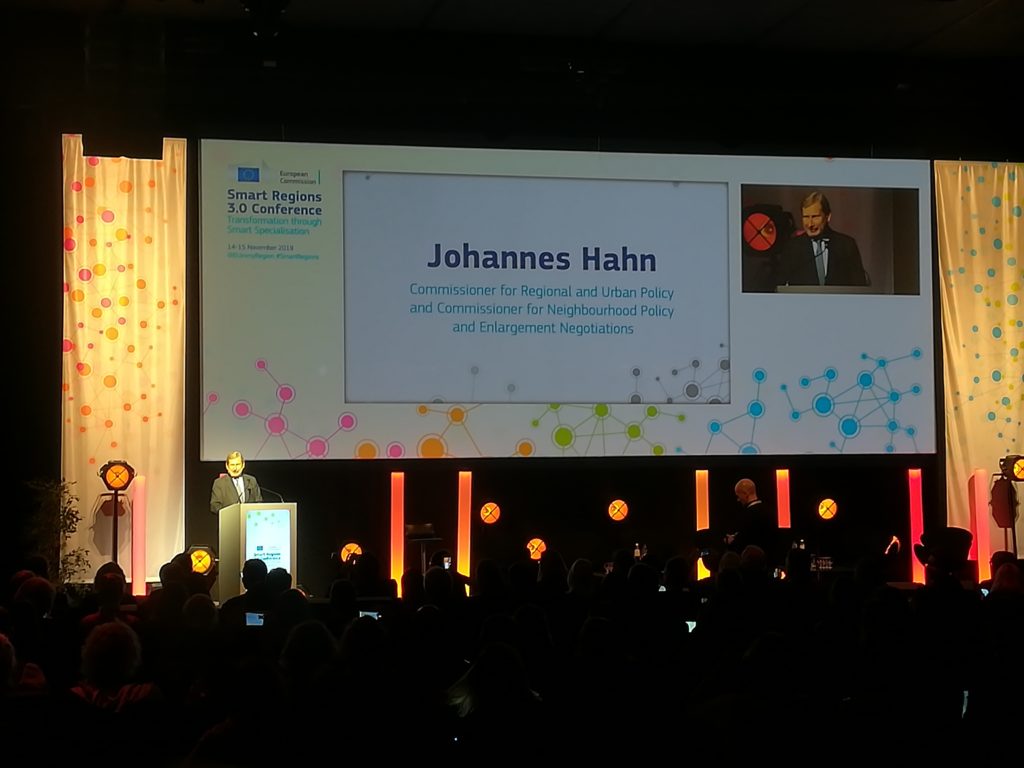On 14-15 November 2019, the European Commission organised its third edition of the Smart regions 3.0 conference, focused for this year on boosting innovation and supporting the catching up regions through Smart specialisation.
For two days, more than 600 regional representatives gathered in Brussels to reflect on today’s challenges – globalisation, new technologies, transition to a carbon neutral, circular economy – together with the European institutions – DG REGIO, DG GROW and DG RTD, as well as officials from the Committee of the Regions, research institute and regional authorities across EU. The conference was the opportunity for everyone involved in the implementation of S3 to discuss and exchange with others on bottlenecks for regional innovation, for innovation diffusion, for building regional ecosystems and collaboration mentality.
Four parallel sessions took place related to industrial transition and closing the innovation gap in catching up regions:
- Boosting innovation-led growth in the EU industrial transition regions
- Supporting the catching up EU regions to close the innovation gap
- Investments in interregional innovation projects
- Development of value chains in catching up regions
Designing a smart specialisation strategy and addressing policy challenges
Commissioner Johannes Hahn opened the conference highlighting achievements such as the success of the S3 Platform for Industrial Modernisation, where ECRN has established the Thematic Area on Chemicals , as well as the Regions in Transition Platform. Key directions and advice were shared with the audience to ensure the Smart Specialisation Strategies in 2021-2027 will be an efficient tool for the economic transformation.
Taking into account the specificity of its members, ECRN took home several crucial messages:
- Identify priority areas in a participatory process
Both EU and regional officials agreed that better involvement of stakeholders lead to better economic growth of the region. In this sense, regional authorities shall keep in mind to build the strategy together with the SMEs, not for the SMEs. The key would be to co-create together between local stakeholders and public services. Trust has been an important factor in this regard, and stakeholders advised to start with small project, slowly building a common vision and reinforcing trust through common activities.
- Design of transformation roadmaps through project mapping and keeping space for experimentation
A successful smart specialisation strategy is achieved first through projects mapping. Here, regional stakeholders were advised to prioritise selection of projects that would bring transformation process and not merely select certain sectors. At the same time, experimentation is also crucial in order to create space for transformation. Hence, a great balance between planning and discovery needs to be established.
- Focus on Human capital: encourage logic of entrepreneurship and think in anticipation of skills
Highlighted during the parallel sessions and in the plenaries, the heart of the regional economy is its human capital. Besides preventing the migration of human capital, especially in the lagging regions, public authorities shall encourage entrepreneurship spirit and make sure to anticipate the skills needed in the future in their smart specialisation strategies.
- Link your smart specialisation with the transition to a greener cleaner economy
The European Commission priorities for 2019-2024 shall be taken into account. For instance, the European Green Deal proposed by the EC President von der Leyen is an issue of making each region part of the transition. The aims of the European Green Deal and the S3 is to contribute efficiently to the change and transformation towards a green sustainable and carbon neutral European economy.
Supporting the catching up regions to close innovation gap and enhance the development of value chains
Because of their localisation, size, number of private companies, unemployment and education system, some European regions are lagging behind in terms of growth and climate transition. Two parallel sessions were dedicated to the challenges faced by the catching up regions and to brainstorm solutions to meet these challenges.
The role of public institutions to incentivise companies to innovate has been mentioned as crucial. Regional government expenditure shall be targeted on high education, SMEs and R&D. Besides, participants underlined the importance of the support of interface entities and intermediaries making the link between SMEs, research centers and public services such as clusters and regional development agencies.
Various ideas were suggested by representatives of lagging regions. Once again, stakeholders shall be consulted and involved when building a strategy or drafting new legislation. Eventually, public governments shall look at the global product network and the value chains currently based in their territories and aim to upgrade intersectorial links.
Strengthen innovation diffusion and inter-regional cooperation
In interactive sessions, participants exchanged their views on how to strengthen innovation diffusion and how to promote collaboration, as well as what is the support needed by the European institutions in this regard.
Much more support for networking, more incentives for collaboration, inclusive instruments and match-making activities were requested. Regions shared their views that RIS3 should be more outwards looking, building on complementarities, and, this should be incentivised in a structured manner. In this regard regions advocated for the future instrument on Inter-regional innovation investment.
Participants also raised awareness for the need of more sharing platforms and forums for discussion and the need for support in the creation of clusters and intermediary entities between industries, research centers and the public services.
In the closing discussion, Marc Lemaitre, Director of DG REGIO, insisted on the fact that the Smart specialisation shall not be seen as an imperative temporary process but a permanent and voluntary one. Smart specialisation is about building the best possible future, combining flexibility and policy direction. It should be integrated with industrial policy and innovation strategy and envisaged as a whole strategy for the regional growth, declared Jean-Eric Paquet, Director of DG RTD.















